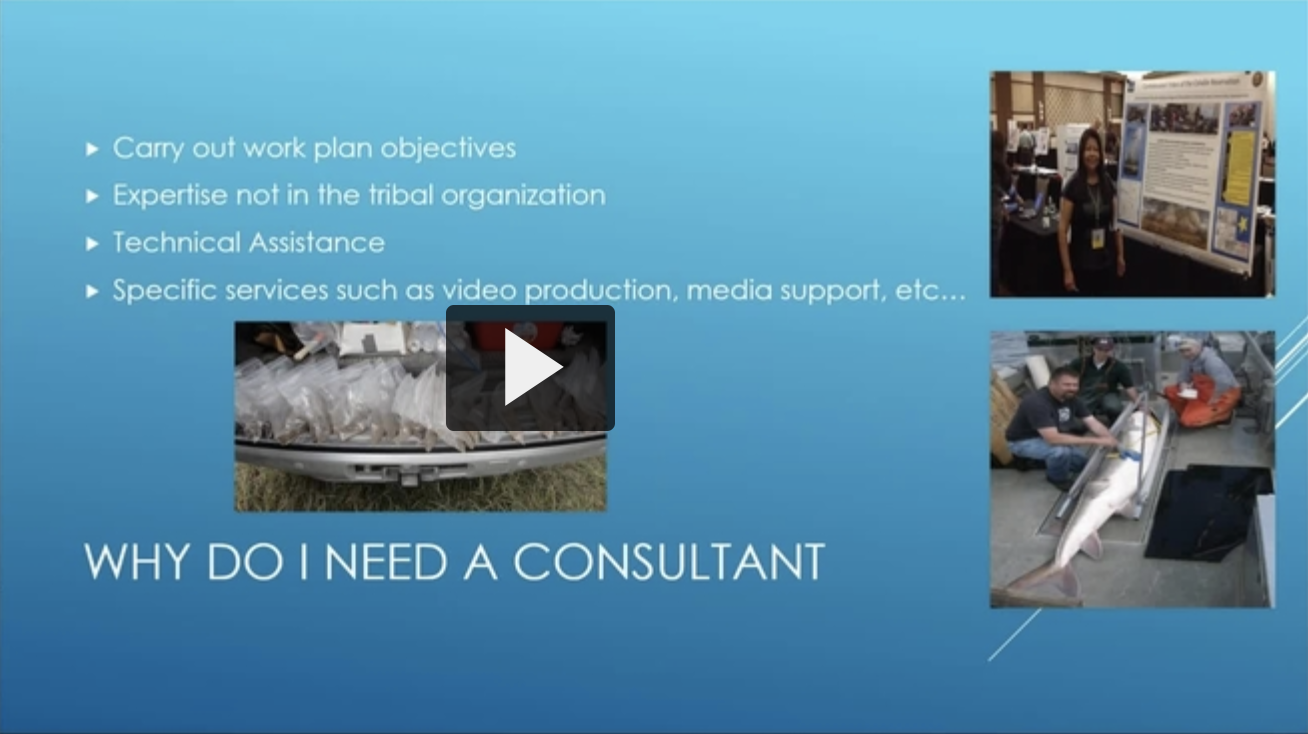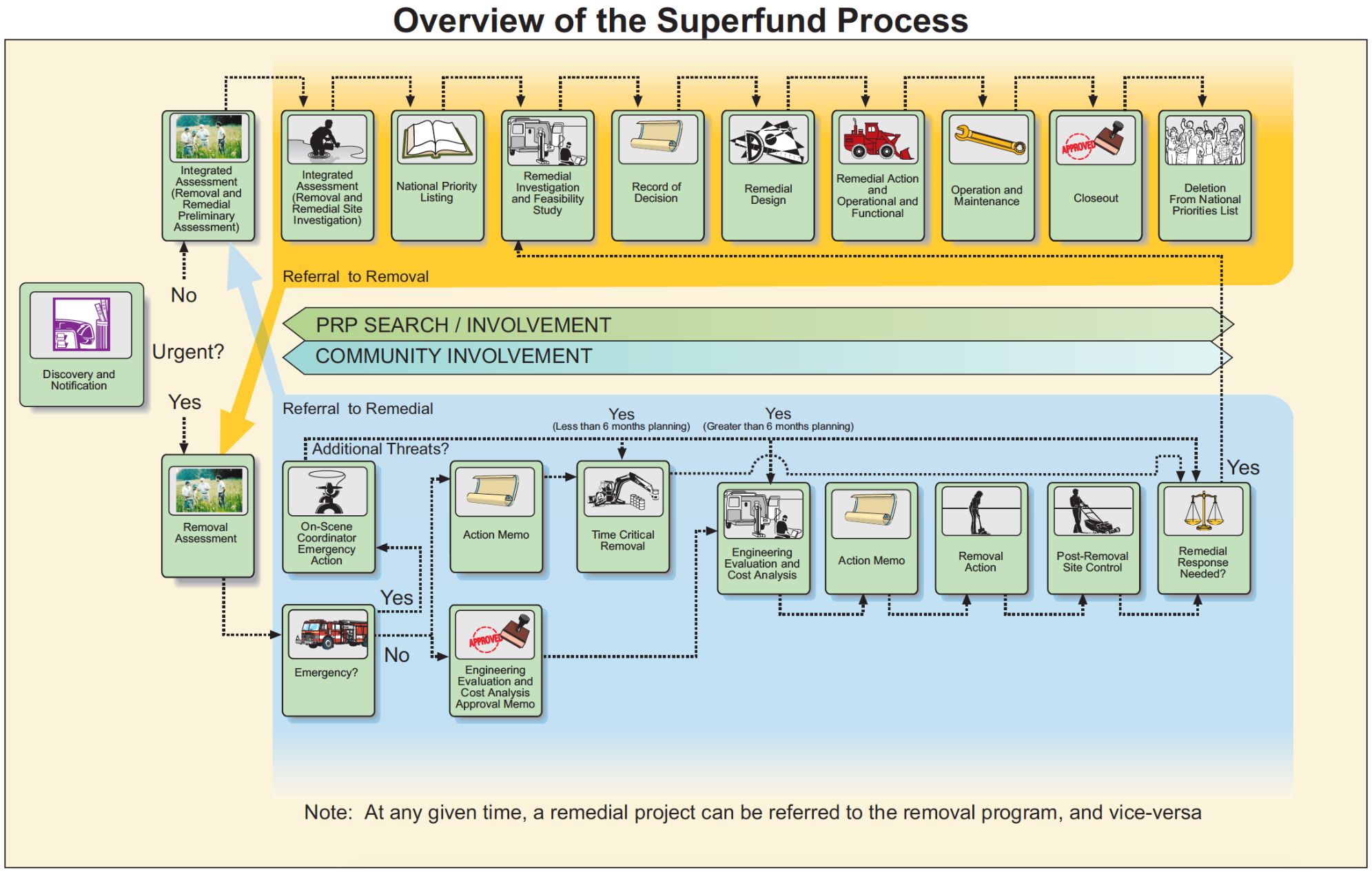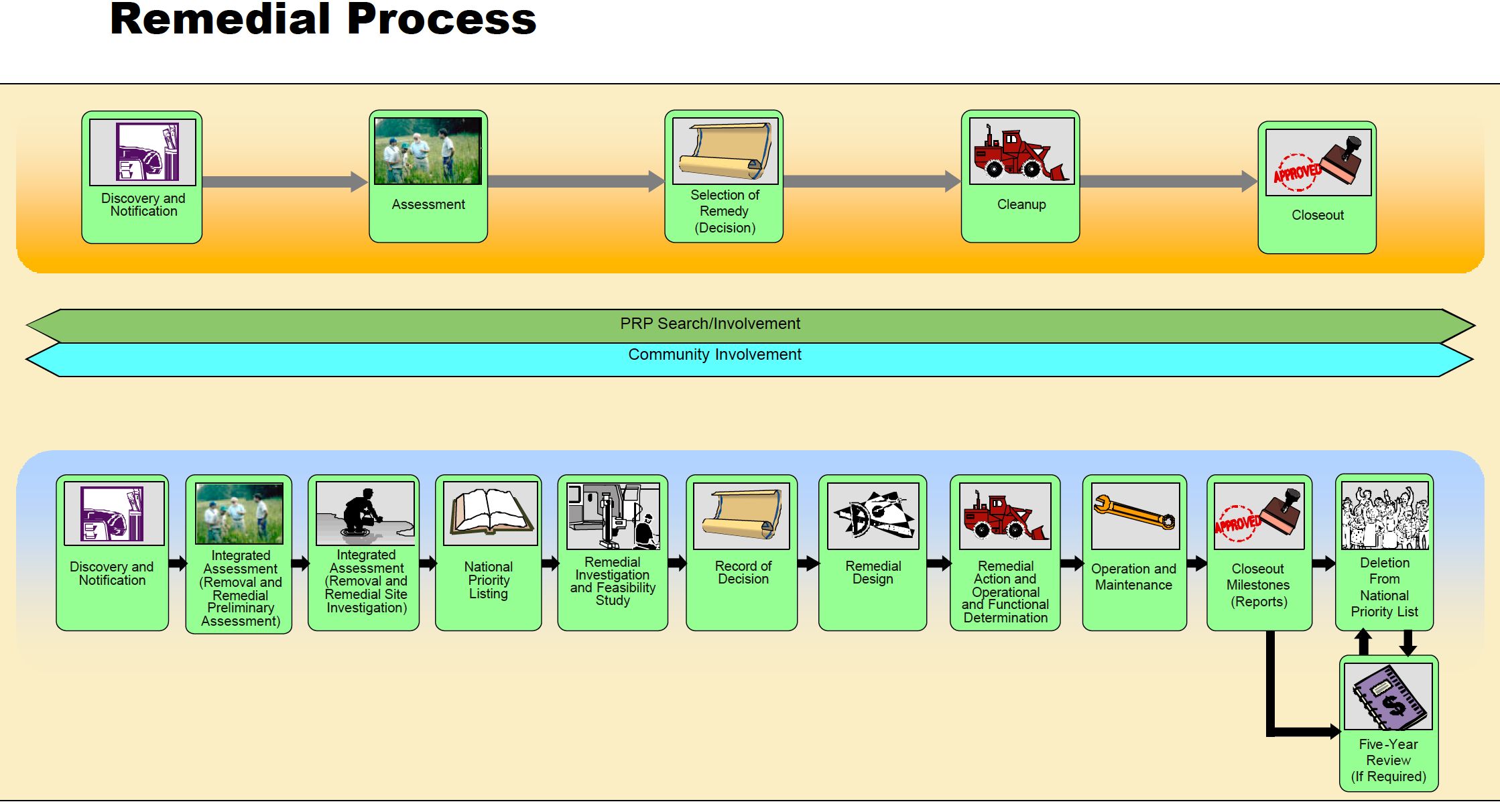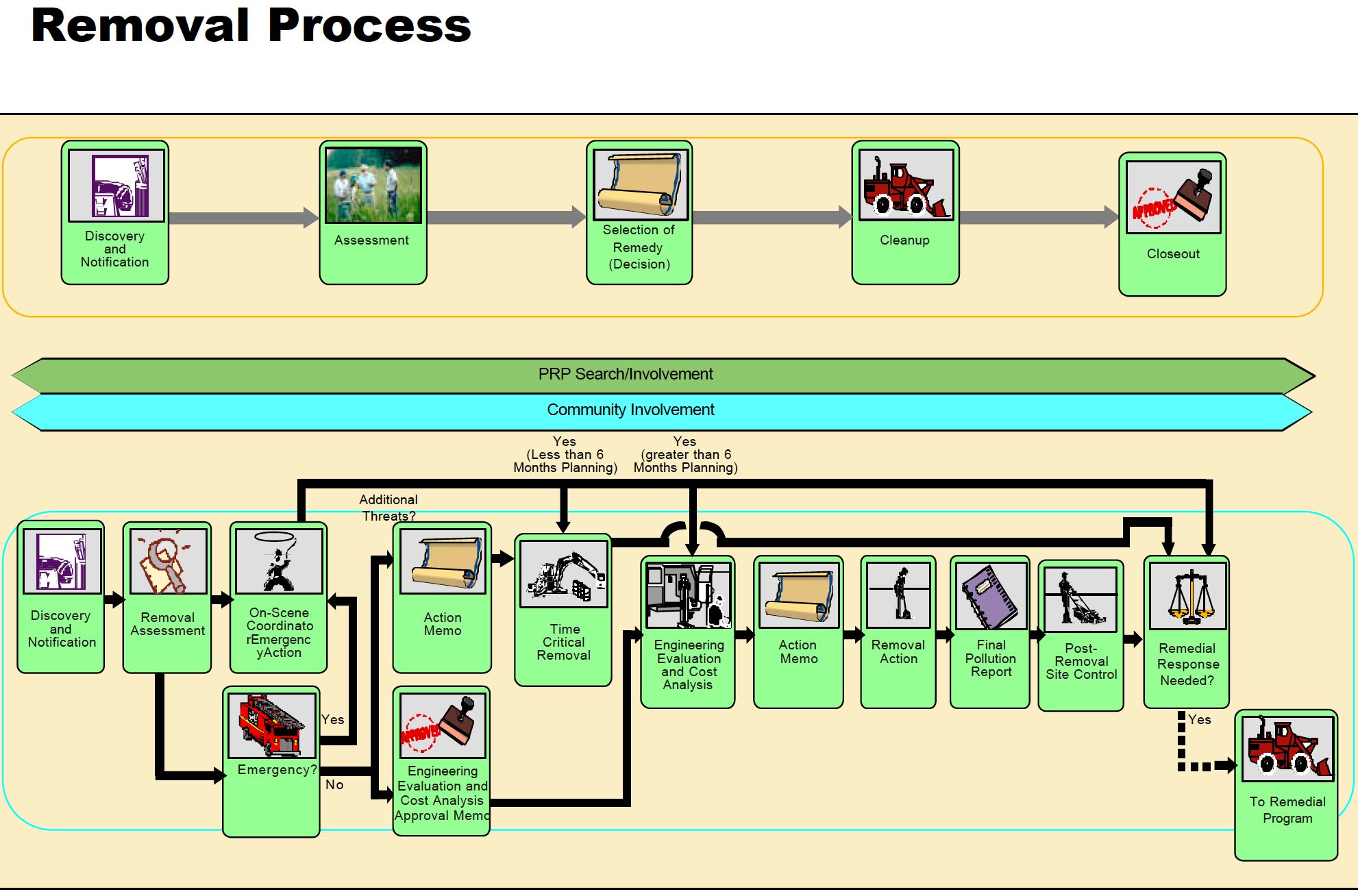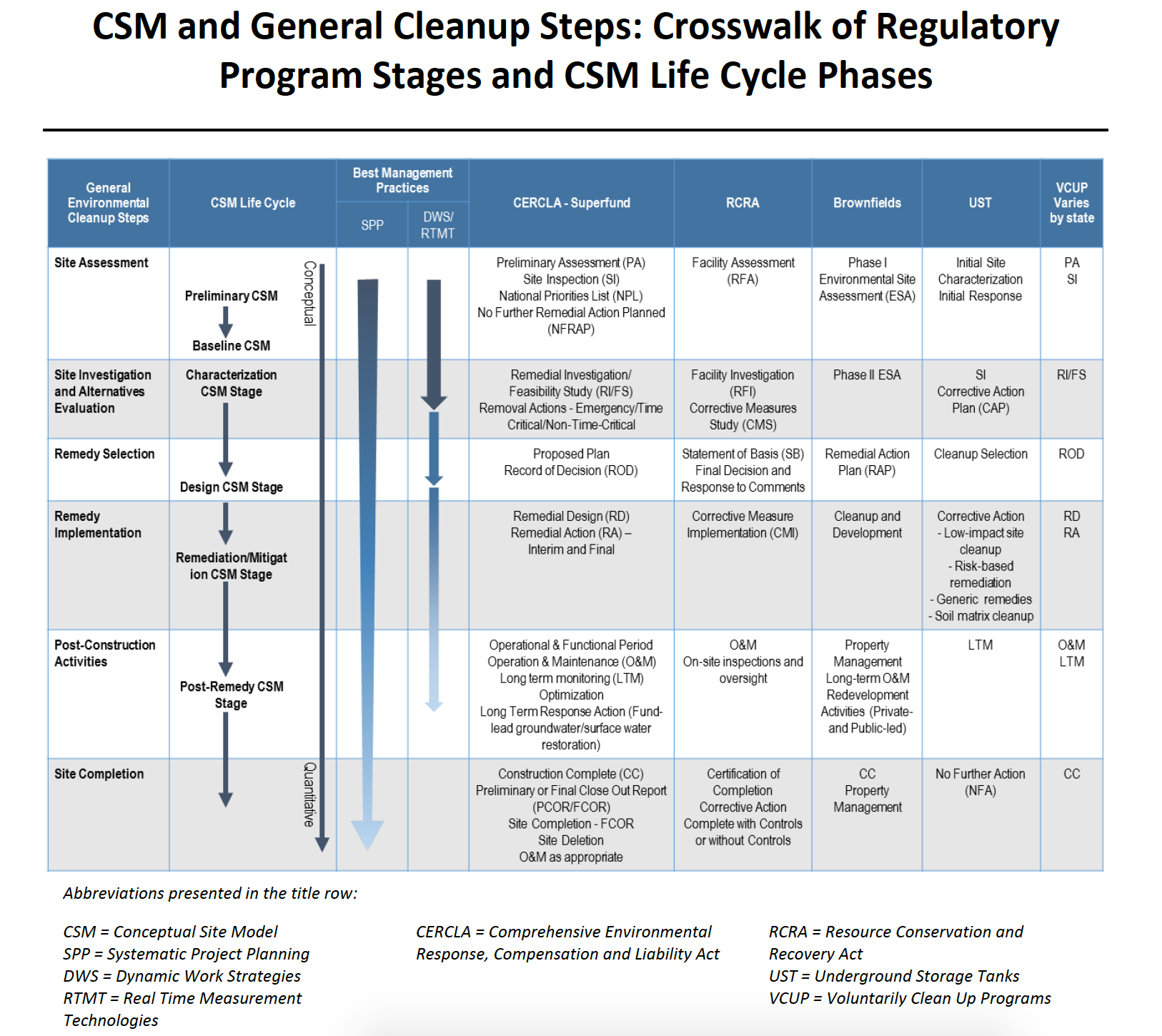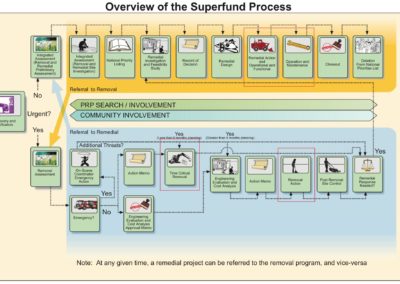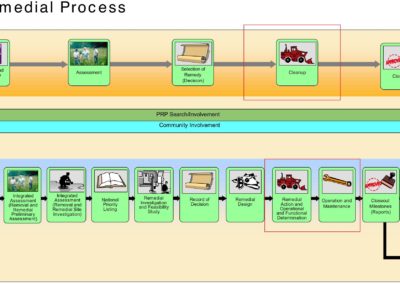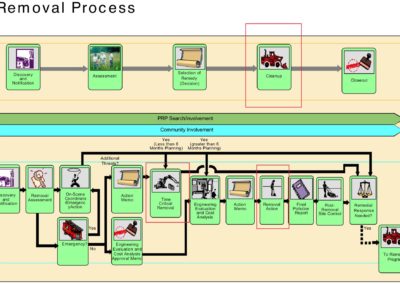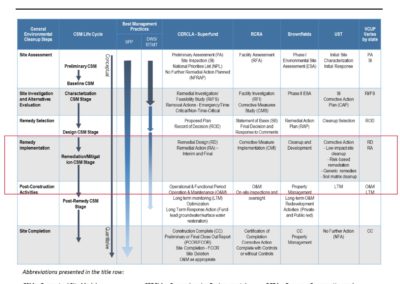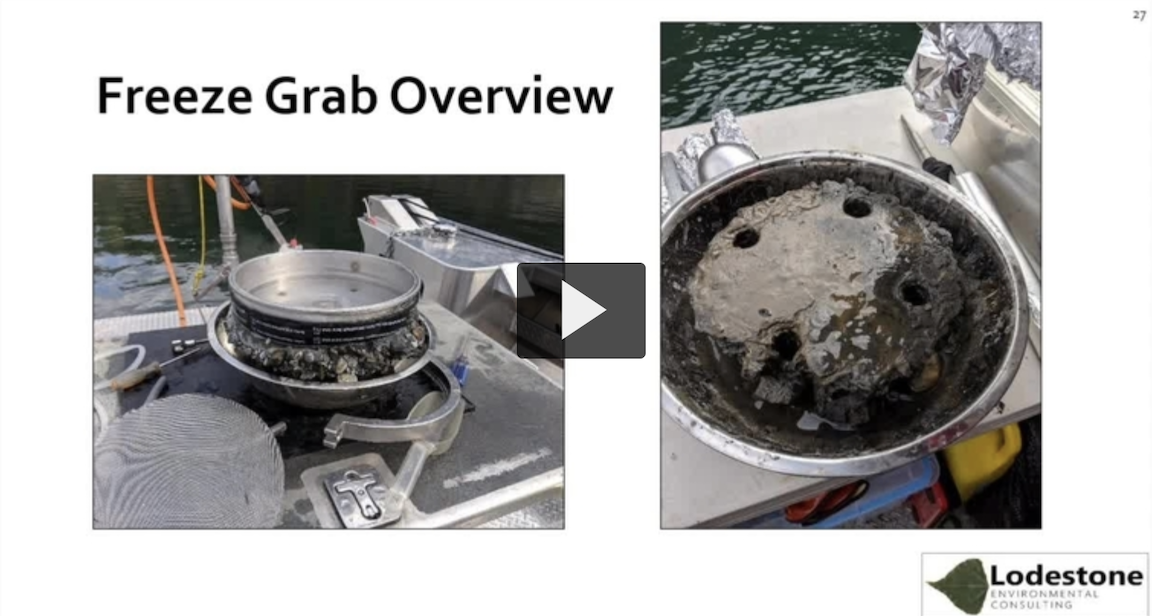This webpage has been developed to provide Tribes with information that is useful when hiring Environmental Consultants and includes the following sections:
-
-
- Environmental Consultants vs. Contractors Implementing Cleanup
- Experience Working with Tribes
- Interview Questions for Potential Environmental Consultants
- Existing Projects
-
The video to the left, Finding and Managing Consultants: 2021 Virtual Panel Discussion, features a project manager and contracting specialist from the Confederated Tribes of the Colville Reservation, as well as a contractor who has worked with them for several years on contaminated sites.
Environmental Consultants vs. Contractors Implementing Cleanup
Environmental consultants are your technical partners and offer a wide range of services, whereas contractors implement the cleanup and need to adhere to specific requirements depending on the agency and laws that the contaminated site falls under.
What Consultants May Assist With
Although some environmental consultants may conduct cleanups, more often they are hired to assist with:
-
-
- evaluating the site
- providing recommendations for cleanup
- designing and specifying the site cleanup or remediation work
- acting as a liaison with various agencies and their requirements
- procurement and management of remediation/construction services
-
Read More
Environmental consultants can also assist with evaluating cleanup alternatives, interpreting testing and monitoring data, preparing remedial designs, and drafting construction contracts. They can provide technical review of design and specification documents, estimate construction or remediation costs, and draft contractual agreements and bid documents. They can also advise at various stages, such as identifying prospective contractors, evaluating contractor bids/proposals, administering and observing the remediation work, reviewing changes and pay requests, and verifying remediation system performance or cleanup compliance.
Managing the contract for construction/remediation requires sustained engagement that may become a challenge for Tribes. Alternately, consultant fees may be substantial if a Tribe is outsourcing all of the work needed to procure and manage remediation/construction services, especially for projects that extend over many months or years.
Tribes can define the role that environmental consultants play in cleanup projects depending on the size of the project, magnitude of the contamination, Tribal capacity, and available funding. Environmental consultants might work with your Tribe as a collaborator, as a lead, or in an oversight capacity.
Consultant Involvement in the Superfund Process
In the Overview of the Superfund Process diagram, consultants may be involved in all steps (top tier) other than the two NPL (National Priority List) steps and the ROD (Record of Decision) step. For the bottom tier (emergency action), consultants may be involved in all steps, with potentially more involvement at certain steps such as engineering and removal.
Consultant Involvement in the Superfund Remedial Process
In the Superfund Remedial Process diagram, consultants may be involved in all steps (top tier) other than the two NPL steps and the ROD step.
Consultant Involvement in the Superfund Removal Process
In the Superfund Removal Process diagram, consultants may be potentially involved in nearly all steps in the top and bottom tiers.
When following EPA’s Conceptual Site Model (CSM) General Cleanup approach, shown in the diagram, environmental consultants may be involved in all of the indicated steps (all rows in the table). As shown in the table, the CSM has been developed as a tool for use with a variety of site clean up types: Superfund, RCRA, Brownfields, UST, and Voluntary Clean Up Programs. Learn more and access additional resources at CLU-IN’s Key Optimization Components: Conceptual Site Model webpage.
Experience Working With Tribes
You may choose to hire professional support from service providers and consultants that have experience working with Tribes. Therefore, when soliciting support, you may request contact information to talk to Tribal representatives that have worked with that contractor. See the interview questions for potential environmental consultants below the list of consultants.
The following consultants (listed in alphabetical order) have worked with one or more Tribes in the past five years and will provide Tribal references:
Campbell Environmental Group
Contact Person: Rich Campbell, rcampbell@cegenvironmental.com, 207-253-1990
Service Area / Region: Nationwide
Size of Company: small (fewer than 20 employees)
Address: 173 Gray Road, Falmouth, ME 04105
Types and States of Professional Licensure: National ASTM Environmental Professional, Certified Geologists and Engineer, Maine and New Hampshire
Specialty Certification: Phase I ESAs, Environmental Professional
Specialty Areas: Brownfields; Health and Safety Plans, Quality Assurance Project Plans, Remediation (Air, Groundwater, Soil, and Building Materials), Phase I and II Environmental Site Assessments, Federal Facilities, Leaking Underground Storage Tanks
Contamination Experience: Hydrocarbons, Agriculture-Related, Landfills and Waste Impoundments, PFAS, PCBs, Dioxins, Metals, SVOCs, VOCs, Herbicides, Pesticides, Coal Tar
Agency Experience: EPA, BIA, State Agencies
Other Technical Assistance: Interpreting Technical Reports, Conduct Field Surveys, Draft Policy and Guidance Documents, Emergency Response, Environmental Impact Assessments, Public Outreach and Education
Additional Information: Contact us for additional information and see our website at www.cegenvironmental.com.
EN3 Professionals, LLC
Contact Person: Bill Auberle wauberle@en3llc.com and Charlie Schlinger cschlinger@en3llc.com
Service Area / Region: Southwest, Midwest/Great Lakes, Nationwide
Size of Company: small (fewer than 20 employees)
Address: 2532 North 4th Street, #610, Flagstaff, AZ 86004
Types and States of Professional Licensure: Environmental Engineering: LA, OH, AZ, MI; Civil Engineering: CA, AZ, CO, MI, MN; Geology: AZ
Specialty Certification: Board-Certified Environmental Engineer
Specialty Areas: Superfund – Remedial, Superfund – Removal, Federal Facilities, Abandoned Mine Lands, RCRA Corrective Actions, Leaking Underground Storage Tanks, Energy Production Sites, Mine Sites, Industrial Sites, and Renewable Energy Sites
Contamination Experience: Hydrocarbons, Radionuclides, Landfills and Waste Impoundments, PFAS, Mining Waste / Tailings, Hexavalent Chromium, Emerging Contaminants of Concern
Agency Experience: EPA, BLM, DOI, USDA, BIA, & Numerous Tribal, State, City and County-Level Agencies; State Agencies: AZ, MI, OH, WV, TX
Other Technical Assistance: Interpreting Technical Reports, Draft Policy and Guidance Documents, Mentoring, Capacity-Building, Training, Project Management, GIS, Regulatory, Conduct Field Surveys, Modeling, Risk Assessment, Public Outreach and Education
Industrial Economics, Inc. (IEc)
Contact Person: Gail Fricano, gfricano@indecon.com, 617-833-3493
Service Area / Region: Nationwide
Size of Company: large (over 100 employees)
Address: 2067 Massachusetts Avenue, Cambridge, MA 02140
Specialty Areas: Superfund – Remedial, Federal Facilities, Abandoned Mine Lands, Natural Resource Damage Assessment
Contamination Experience: Hydrocarbons, Agriculture-Related, Radionuclides, Landfills and Waste Impoundments, PFAS, Mining Waste / Tailings, Emerging Contaminants of Concern, Oil and Gas Production, Transmission and Storage
Agency Experience: EPA, DoD, DOI, NOAA & most states; see map
Other Technical Assistance: Interpreting Technical Reports, Conduct Field Surveys, Modeling, Risk Assessment, Draft Policy and Guidance Documents, Environmental Impact Assessments, Public Outreach and Education, Climate Change, Ecosystem Services, Water Rights, Socioeconomics, Oil Spills, GIS
Additional Information: Please see our website including our Remediation and Tribal Work qualification sheets or contact us for additional information or references.
Lodestone Environmental Consulting LLC
Contact Person: Whitney Fraser, fraser@lodestonellc.com, 206-739-5993
Service Area / Region: Nationwide, with Pacific Northwest Focus
Size of Company: small (fewer than 20 employees) woman-owned
Address: 1122 E Pike St. #1317, Seattle, WA 98122
Specialty Areas: Superfund – Remedial, Natural Resource Damage Assessment
Contamination Experience: Mining Waste / Tailings, Sediments, Soils, Water, Plants, Fish, Metals
Agency Experience: EPA, DOI
Other Technical Assistance: Interpreting Technical Reports, Conduct Field Surveys, Risk Assessment, Public Outreach and Education
Additional Information: www.lodestonellc.com https://www.linkedin.com/in/whitney-j-fraser/
Oklahoma Environmental Services, Inc.
Contact Person: Deanna Atkinson, deanna.atkinson@oeservices.net, and Terri Roberts, terri.roberts@OEServices.net, 888-584-3386
Service Area / Region: Oklahoma
Size of Company: medium (20-100 employees) HubZone
Address: 2424 North Kelley Avenue, Oklahoma City, OK 73111
Types and States of Professional Licensure: Oklahoma licensed remediation consultants, monitoring well drillers, storage tank removers
Specialty Certification: Asbestos Inspector
Specialty Areas: Brownfields, Federal Facilities, RCRA Corrective Actions, LUSTs
Contamination Experience: Hydrocarbons, Agriculture-related, PFAS, Oil and Gas Production
Agency Experience: EPA, DoD, BLM, Oklahoma State Agencies
Other Technical Assistance: Interpreting Technical Reports, Conduct Field Surveys, Risk Assessment
Ridolfi Environmental
Contact Person: Bruno Ridolfi, bruno@ridolfi.com, 206-436-2758
Service Area / Region: Nationwide, with Pacific Northwest focus
Size of Company: small (fewer than 20 employees) woman-owned
Address: 500 Union Street Suite 1010, Seattle WA 98101
Types and States of Professional Licensure: Professional Engineering Licenses in Alaska, Washington, and Oregon
Specialty Certification: Civil, Environmental, Mining Engineering
Specialty Areas: Superfund – Remedial, Superfund – Removal, Brownfields, Federal Facilities, Abandoned Mine Lands, RCRA Corrective Actions, Leaking Underground Storage Tanks, Former Military Sites, and Contaminated Sediment Sites
Contamination Experience: Hydrocarbons, Agriculture-Related, Radionuclides, Landfills and Waste Impoundments, PFAS, Mining Waste / Tailings, Military, UST/LUST, Superfund, Brownfields, and Sediment Sites
Agency Experience: EPA, DoD, BLM, DOI, USDA, BIA, Work for Tribes on Cleanup of Former DoD and Military Impacts
Other Technical Assistance: Interpreting Technical Reports, Conduct Field Surveys, Modeling, Risk Assessment, Draft Policy and Guidance Documents, Emergency Response, Environmental Impact Assessments, Public Outreach and Education, Chemical Data Validation, Pollutant Allocation, Chemometric Analysis
Additional Information: Please contact us for a Statement of Qualification and see our website at ridolfi.com & ecochem.net to learn more.
ITEP will continue to update this webpage as we become informed of contractors that have experience working with Tribes. Therefore, please provide the information requested on the TLAC Consultant Request Form if you or consultant you work with would like to be added to this website as a resource.
Interview Questions for Potential Environmental Consultants
To comply with the terms and conditions of federal funding requirements, EPA cooperative agreement and grant recipients must competitively procure the services of environmental consultants. See EPA’s Funding Instruments and Authorities webpage for details. Procuring environmental consultant support is generally accomplished by issuing a request for proposal (RFP), reviewing proposals and selecting the most capable and responsive parties.
Read More
The RFP for services must clearly and specifically describe the statement of work for the project, tasks, responsibilities, schedule (particularly if driven by grant funding), deliverables, and level of quality the environmental consultant and its subcontractors are expected to achieve. The RFP should include site background information, if available, and references to federal, state, or local requirements that will apply to the project (for example, laws, special training, and document format). If not familiar with these requirements, recipients should minimally require that the environmental consultant and its subcontractors meet all applicable federal, state, and local training, and professional certification or registration requirements. Recipients should also require that environmental consultants comply with all applicable laws and regulations, including those regarding worker, public health, and safety.
The RFP should require the environmental consultant to technically describe how project goals and quality requirements will be achieved. The environmental consultant is also required to illustrate its qualifications and past performance record using previous project examples, resumes, and references. The RFP should require that the environmental consultant includes a project management plan which identifies who will lead the effort and who will be supportive as well as a subcontracting plan. The RFP should emphasize that the environmental contractor must prepare and complete Quality Assurance Project Plans (QAPPs) to a level of quality that will successfully result in EPA and state approval. However, the recipient must work with the environmental consultant to jointly achieve this outcome.
Cooperative agreement recipients are advised to:
- Communicate with their Regional EPA representative to seek input on hiring consultants. The representative can also provide information on other entities that provide technical and procurement resources and support under EPA-funded programs.
- Perform background research by consulting other Tribes who have hired environmental consultants, checking references for all proposals, and requesting that applicants provide reviews on previously completed projects. This will help in evaluating proposals and selecting a qualified environmental consultant.
- Create clear communication plans which are critical for projects where innovative strategies and technologies are included, as they typically require more frequent and sometimes near real-time data submittals.
Environmental Consultant Questionnaire: The questions below are intended to assist Tribal and Alaskan Native Village (ANV) environmental and procurement personnel with developing the information needed to make a decision on hiring an environmental consultant. More specifically, these questions are intended to draw out whether a given environmental consultant/contractor has the necessary capability, documented experience, qualifications, depth and breadth of expertise, references, credentials, registrations, insurance(s), etc., to be considered for environmental consulting work on Tribal or ANV environmental sites / projects. The information below is also provided as a word document, Environmental Consultant Questionnaire, for Tribes to edit specifically to their project and cultural needs.
Expertise and Experience
What specific services does the consultant see as necessary for the proposed project?
What services would the consultant specifically exclude for the proposed project? If the consultant anticipates that a certain type of service, e.g., geotechnical or geo-environmental subsurface investigation and testing, is unlikely to be needed, they may want to explicitly state this, so that both parties understand what is not being provided, as well as what is being provided.
Does the consultant anticipate unique or special conditions or considerations on the proposed project?
Physical proximity to proposed project location(s)
What is the distance between the consultant’s location for managing and staffing the project and the proposed project location?
Does the consultant foresee a potential need for rapid response during the course of the proposed project?
If so, how will the consultant meet this need?
Experience working with Tribes & Alaska Native Villages
Describe environmental consulting services that the consultant has previously provided to the Tribe/ANV, or that is ongoing.
Describe environmental consulting services the consultant has previously provided to other Tribes & ANVs, or that is ongoing.
Project leadership and staffing of proposed project
Who will the consultant designate as project manager on the proposed project?
What is their specific experience that is relevant to the project type being considered?
What is their experience with Tribal or ANV projects? In the event that the designated project manager is unavailable, for whatever reason, who will be the consultant’s designated alternate project manager?
What is the alternate’s specific experience that is relevant to the project type under consideration?
What is the alternate’s experience with Tribal or ANV projects? Describe.
Firm and individuals’ staff registration(s) and certification(s)
What individual or firm registrations or certifications does the consultant offer that are applicable to the proposed project?
What is the consultant’s understanding of registration or certification criteria that apply to the proposed project?
Is the consultant willing to provide documentation of registration / certification of key staff?
Insurance
What relevant insurance does the consultant routinely carry?
What other types of insurance has the consultant obtained when stipulated by an owner / client?
Is the consultant willing to provide required certificates of insurance?
Data and information confidentiality; software
What experience does the consultant and any consultant subcontractors have with maintaining confidentiality of sensitive cultural or other types of information? Provide relevant examples from work with Tribes or ANVs.
Schedule and Cost Control
What practices does the consultant utilize to control and adhere to project schedules?
What practices does the consultant utilize to manage project budgets?
Reports, Data and Software
What reports to the Tribe or ANV, interim and final, does the consultant anticipate submitting for this project?
What project management tools will the consultant use for the proposed project? What if any outputs from these tools will be made available to the Tribe or ANV?
What software, proprietary and otherwise, does the consultant anticipate needing and using for the proposed project? What digital files would be provided to the Tribe or ANV during and upon completion of this project type?
Subcontracting by Consultant
What percentage (of the total cost to the Tribe or ANV) of the proposed project does the consultant plan to complete using their own personnel, and what percentage, if any, will be subcontracted?
What prospective subcontractors would the consultant use on the proposed project and for what scope(s) of service(s)?
What experience do these prospective subcontractors have with Tribal or ANV projects?
What firm and staff registrations do these subcontractors maintain?
References
Do you have specific Tribal or Alaska Native Village references that we may contact? If so, please provide contact information for each.
Consultant’s awareness of cultural and other resource protection
What is the consultant’s understanding of cultural resources management and protection? What experience do they have in this regard?
Same question, but as applied to prospective subcontractors.
What is the consultant’s understanding of cultural confidentiality and protection of traditional ecological knowledge (TEK)? What is their experience in these areas?
Same question, but as applied to prospective subcontractors.
Consultant’s experience with contracting between their firm and a Tribe or an ANV
Has the consultant reviewed sample contract documents that may have been provided as part of the solicitation for this contract?
Does the consultant have any concerns regarding those documents?
Does the consultant and its subcontractors, if any, have experience with Tribal systems for procurement of environmental services? Please cite specific examples.
Please explain how the firm and its representatives would manage the project and contractual or project management relationships with the Tribe and any other entity designated by the Tribe.
Consultant’s experience with environmental remediation or clean up project delivery methods
What project delivery systems does the consultant have experience with, e.g., design-build, CMAR, design-bid-build, etc.?
Which of these is the consultant most comfortable with?
Which of these has the consultants worked with on Tribal or ANV projects that they have done to date?
DBE and local hiring matters
What experience does the consultant have with projects on which consultants or subconsultants were required to meet DBE (Disadvantaged Business Enterprise) criteria?
Does the consultant foresee for the proposed project any personnel needs that might be met through hires of Tribal or ANV members?
Regulatory / governmental framework and related considerations
What is the consultant’s understanding of the regulatory framework for the proposed project? Provide examples of other Tribal or ANV projects conducted under a similar regulatory framework.
What is the consultant’s understanding of the Tribal or ANV government as it pertains to this project? Any experience in this regard?
Is the consultant prepared to make presentations to Tribal council or other governing Tribal authorities, either as identified in a scope of services, or on an as-needed or as-requested basis?
Other
Will the consultant assist with interpretation of results/technical reports?
Will the consultant assist with public outreach, attend community meetings, etc., develop fact sheets/results with layman terms for the public, etc.?
What is the consultant’s experience with the procurement process for specific federal projects such as Superfund, Brownfields, etc. (because different agencies, and even programs, may have different procurement requirements)?
Questions for References
What is the relationship between the reference or reference’s organization and the consultant or consultant’s staff members, and for how long has it existed?
What project(s) has the consultant completed for the reference’s organization, date(s) of start and completion(s), and overall outcome(s)?
Was(were) the project(s) completed on time? Elaborate.
If any occurred, did the owner or consultant initiate changes in schedule?
Was(were) the project(s) brought in on budget? Elaborate.
If any occurred, did the owner or consultant initiate changes in budget?
What challenges, difficulties or otherwise noteworthy conditions existed or were encountered on the project(s)? How did the consultant deal with these conditions?
Would the reference or reference’s organization again hire the consultant? If yes, why? If no, why not?
Is the reference aware of other organizations for whom the consultant has done work? If so, what are those organizations?
Please describe how the consultant’s project manager (PM) led the project.
Please describe how the PM handled difficulties that arose during the course of the project.
If the project(s) was(were) to be done again, what would you have done differently?
Why was this consultant chosen instead of other candidate consultants?
How was this consultant hired? Following an RFP or RFQ process? If not, what process was used?
What other consultants were considered?
Is this consultant still engaged on one or more projects?
What services did the consultant provide on the project(s)?
Does the reference consider the consultant a partner in their success? Why or why not?
How pleased are you with the services provided by the consultant’s staff? Please rank on a scale of 1 to 5, with 5 being the best.
Stresses and Successes: A Difficult Responsibility for Tribes Restoring Contaminated Lands and Water presented by Whitney Fraser, Lodestone Environmental Consulting LLC.
Existing Projects
ITEP has facilitated Superfund conference calls and webinars that highlight the work of Tribal representatives, agencies, and contractors that you may also be interested in contacting. The recorded calls and videos can be accessed by clicking on “TSFWG Meeting Notes, Presentations, and Recordings” on TLAC’s Tribal Superfund Working Group webpage. Check back periodically for recent webinars.

